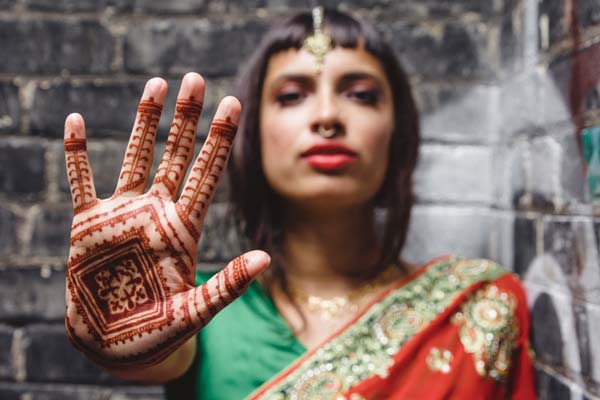In between saving the world and meeting her she-roes, Canadian independent singer-songwriter Alysha Brilla has been working on her fourth album.
The daughter of an Indo-Tanzanian father who immigrated to Canada and a Canadian mother of European settler heritage, Brilla creates music that draws on the influences of her unique background, blending Indian and East African sounds with a contemporary aesthetic.
Lyrically, Brilla writes about the value of love, equity and spirituality in times of global and personal turmoil.
It's a good thing then that she's booked in to play Island Vibe Festival (SE QLD) as well as Queenscliff Music Festival (VIC), where she'll hopefully be showing off some tunes from her new forthcoming album 'Rooted'.
What do you think makes your music unique?
Rhythm and lyrics. It’s sort of un-genre-able [sic] and I have been that way long before it was cool. I believe it’s a product of growing up in a multicultural house and not really having a reference for that in music, or at least my specific music influence mix.
Is there a single philosophy or message that ties together all your music?
My belief is that art is sacred and music is a healing energetic force on this planet. Also valuing and giving credence and reverence to our collective mother, the earth and all of her expressions.
How does your Indo-Tanzanian/ Canadian heritage influence your worldview and the music you write?
I grew up in a Muslim-Christian household, so there were different celebrations and traditions that we practiced.
Of course I’m going to champion unity, given that my genes and the reason I’m here is because two people from very different parts of the world and cultures fell in love and decided to create me together. Music is the great global unifier and I have witnessed that from my background and the people I’ve been able to meet around the world.
What are you trying to achieve with your upcoming fourth album, 'Rooted'?
'Rooted' is meant to be an ode to our collective mother. The song 'Centre' describes how much I need to be 'plugged in' to my original source to feel at all peaceful, connected. It’s a natural state to be in and hence feels the most secure to me.
I wanted to put those sentiments into songs I could play at festivals with my band and really have us all kinaesthetically absorbing together.
How are you feeling about coming back to Australia?
Amazing. I loved playing Woodford [Folk Festival] two years ago and I think these are critical times for critical conversations about what we are doing here and to this planet.
I’m hoping the music will literally charge people to go to their communities and be active in creating change.
What can audiences expect from your set?
Rhythm and harmony and a whole lot of femme, powerful energy.
Will you be taking some time to further explore Australia while you're here?
Wherever the music takes me, I go. I haven’t been to a single place on planet earth that hasn’t been beautiful. Australia is such an incredible land. I’m really lucky to visit there.
What have your previous travels to Australia taught you about the country and its people?
Hmmm... my previous travels have had me in a bit of an insular social bubble; hanging out with other artists and activists.
Although I know Australia has a similar wrought history to Canada: colonial, imperial and horrible. So, I’m hoping that most white Aussies recognise what it means to be of that legacy and the responsibility associated with being a settler.
I’m part British/ Irish/ Euro mix and I recognise the privilege I carry and also have just witnessed it within my own family. I’m hopeful there are a growing number of people who can understand systems and the world from a zoomed out, wholistic lens.
It’s the only thing that will get us out of many of the messes that colonialism and patriarchy have created. We need to use our amazing brains for social change.
The item/s you never leave home without when you go on tour?
My Diva menstrual cup and twice as many underwear as I will technically need, but inevitably ending up using somehow really fast. A good book and an open mind.
You recently attended the Women Deliver International Conference – what were some of the outcomes and takeaways from the event for you?
It was really amazing and I’m so happy I scored a last-minute ticket. It’s a bit exclusive (a mild criticism) because of the price, and I was definitely one of the very few artists there. But that is what made it interesting for me.
Everyone worked for NGOs, charities, government and collectives with a focus on advancing the rights, health, education and wellbeing of women and girls globally. There was a very interesting correlation between gender equity and addressing climate change.
My takeaway was me being hugely inspired that it was so diverse and an opportunity for folks who do this type of, often exhausting, work daily to come together and inspire each other. There truly are people in communities all over the world trying to make things better.
What work still needs to be done in terms of achieving better gender equity and representation of non-binary performers/ artists?
I can’t speak specifically to representing non-binary artists, as it’s not my lived experience, but I can say that certainly there should be more and visibly more on the radio and festival stages from what I’ve seen and heard.
Women, femmes, non-binary folks (especially BIPOC and allies)... we need to be on stages, in front of mics, sharing our brilliant minds and evolving perspectives with the world; shifting consciousness, shifting cabinets and shifting policies because in a world becoming increasingly exhausted environmentally and socially, our views are fresh air.
I do believe this world will be resuscitated by voices once seen as small, using our voices in unison.

